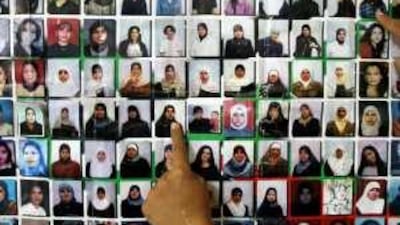TEL AVIV // A Palestinian human rights group yesterday lambasted Israel's treatment of female Palestinian prisoners, saying they are beaten during their arrests, their education and visitation rights are violated and those who are pregnant are shackled before and after they give birth. The report by the Addameer Prisoners Support and Human Rights Association, which was sponsored by the United Nations and based on dozens of interviews with current and former female inmates in Israeli jails, condemned Israel for providing them poor access to health care, education and family visits and said the country's prisons and detention centres were ill-suited for women. Addameer slammed Israel's treatment of pregnant prisoners, saying their hands and feet are often shackled with metal chains when they are transferred to hospitals to give birth. The women are frequently chained to their beds until they enter the delivery rooms and once again afterwards, the group said. Moreover, pregnant inmates or women accompanied by children under the age of two do not enjoy preferential treatment in terms of diet or living space, Addameer added. Many female prisoners develop health problems, including skin diseases, anaemia, asthma, prolonged stomach aches and joint and back pains, because they have little access to natural sunlight, balanced diets, protein-rich foods and ventilation, according to the report. Furthermore, the restricted gynaecological health care leads to infections for many of them. According to Addameer, most of the prisoners were subjected to some form of "mental pressure and torture" during their arrests, typically made during the night at their homes. Furthermore, Israeli interrogators use beatings, insults, threats, sexual harassment and humiliation to coerce the women to make confessions, the group added. Esra Amarneh, a 23-year-old university student from the Deheishe refugee camp near the West Bank town of Bethlehem, recalled being beaten along with her father during her arrest on a snowy night in February of last year and later humiliated by her interrogators. In her testimony to Addameer, Ms Amarneh, who stayed in prison for 10 months, described how she was taken to a special room for strip searching, where female guards threatened to bring in a male soldier to force her to take off her clothes after she refused to undress. When she finally stripped naked, the women guards carried out a body search "and touched me all over my body including intimate parts", she said. Ms Amarneh said that a fellow prisoner, who was 16 at the time, scrambled to cover herself with clothes when she was being strip searched in a room where the bathroom was being used by a male guard, who suddenly swung open the door and rapidly walked out. Ms Amarneh, in an e-mailed reply to questions, recalled being detained in a cell full of insects, with no heating and only wet blankets to protect her from the winter cold, and being shackled in chains on her way to the health clinics or the courtroom. According to Addameer, Ms Amarneh's experience is typical of many of the female inmates. Their numbers have risen significantly since the start of the second Palestinian uprising in 2000, soaring to a peak of 120 women in 2004 from just five inmates four years earlier. In the past eight years, more than 700 women were detained by Israel, which currently holds about 65 Palestinian female inmates. Most the prisoners are young, with 56 per cent of the female inmates in 2007 and 2008 between the ages of 20 and 30 at the time of their arrest, while 13 per cent were under 18. Using tactics such as hunger strikes since 2000, the women have managed to ameliorate their detention conditions, including by convincing the prison administration to liaise with them through a representative and gaining access to a small library and study room at one of the two Israeli prisons in which they are held. But the women still face myriad hurdles in fighting for their rights, Addameer said. Like Ms Amarneh, about a fifth of the Palestinian women detained were university students at the time of their arrest. But most of them, and the majority of the women who have not yet started higher education programmes, are not allowed to pursue their studies by enrolling in distance learning courses at a Palestinian university. The report said Israel only allows inmates sentenced for five years or more - which account for about a third of the female prisoners - to sign up for such courses. Addameer accused Israel in the report of violating the visitation rights of many women. According to data collected by the group in mid-2008, about 60 per cent of the inmates had at least one family member who was not allowed to visit them. Furthermore, women inmates whose husbands are also in prison face months of delays before being permitted visits. vbekker@thenational.ae

Women report abuses in Israeli jails
A UN-sponsored report says that interrogators use beatings, insults and sexual harassment to coerce confessions from Palestinian inmates.
Most popular today
